Knowing how to choose keywords for your website to impact organic traffic and improve SEO is as important now as ever. Consistent updates to the Google search algorithm keep digital marketers busy testing out new concepts to rank higher in search results. However, keyword research’s role in digital marketing has remained the same.
Of course, there’s a catch…
Just because keywords have continued to play a vital role in SEO, the methods we use to find the best keywords are different.
The Importance of Keyword Research for SEO
Have you ever spent time poring over Google Ads, examining all the phrases and terms people use to search for things online? That’s what keyword research is—well, at least a portion of what keyword research all entails.
Marketers use keyword research for several things, such as content ideas based on what people are looking for, optimizing SEO on their website, and so forth. Essentially, keyword research allows people to fine-tune their content strategies.
And, truth be told, their marketing strategy on a much larger level.
You can see why keyword research is so important, but…
Is Keyword Research The End-All of Good SEO?
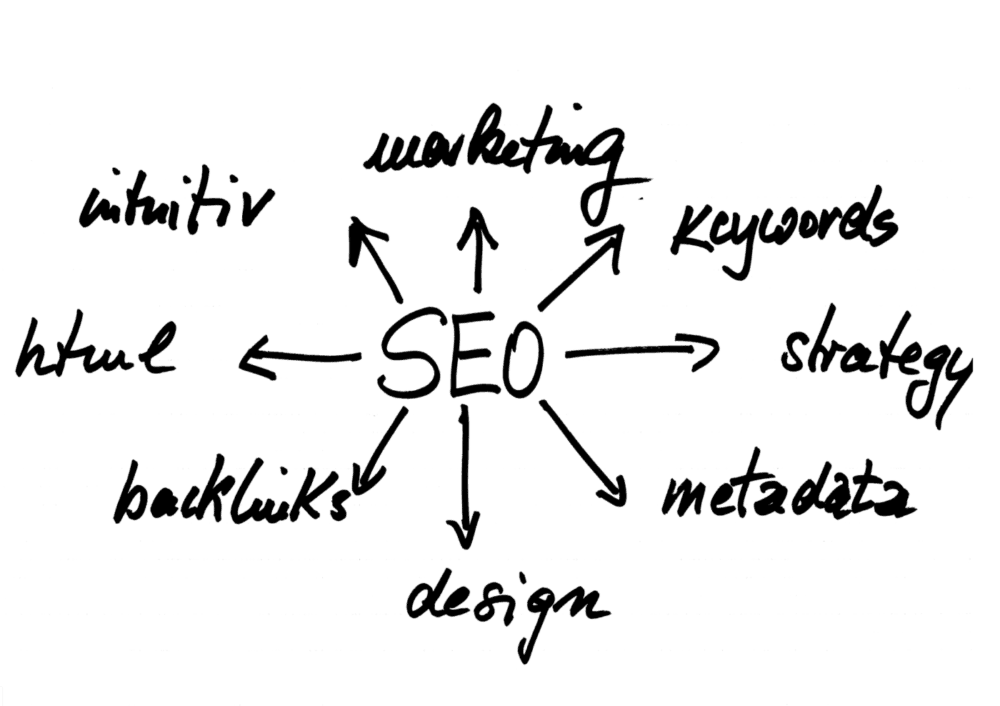
Yes and no. Unfortunately, the answer to that isn’t so clear-cut. On one side, you hear people singing the praises of picking the best keywords and keyword research as a whole. On the other side, you hear some people are declaring that keywords aren’t what they were 10-years ago.
Well, they’re both right.
We’ve already said how important a role keyword research is, but the reality is, keywords aren’t all they were a decade ago. While picking the best keywords is vital to your SEO integrity, it’s not enough to pick the best keywords and optimize your website based on that.
Confused about SEO and keyword research? The SEO experts at 3 Media Web are here to make it easier. Reach out today if you’re ready to boost your organic traffic.
These days, it’s all about the intent of your content.
RELATED POST: Go Beyond Keywords to Build a Local SEO Strategy That Works
Think of it this way:
You’re not trying to create content that ranks well based on how many times you’ve used your target keyword in an article or how well distributed it is in your content.
You should be:
Creating content-based around your keyword research that genuinely solves the problem or answers the questions of people who search your target keyword phrase.

For example, if your keyword research inspires you to create content on, oh, I don’t know, let’s say: how to pick the best keywords, your article should answer that question to the best of your ability. Otherwise, no one will waste their time reading it, and Google will shy away from it.
So, on that note, let’s talk about how to pick the best keywords.

Choose Keywords for Your Website In Just 6 Steps
Before we dig into each of the six steps, here’s a quick over of what we’re going to be covering today:
- Brainstorm and write down topics that are relevant and most important to your company
- Break down those topics into a list of keywords
- Break down those keywords and research more to hone in on the best keywords
- Add long-tail keywords to your list
- Research the competition
- Weed out the weak keywords with Google AdWords
See, that doesn’t sound too difficult. The good news, it’s really not too difficult to pick the best keywords. Let’s take a closer look…
Step 1: Let The Keyword Research Start with Brainstorming
First, grab a pen and paper. We’re going to be making an informal(ish) list to think of about 7-10 broad topics that are:
- Highly relatable to your company
- Highly important to your company
That’s it. Don’t worry too much about narrowing them down just yet. For now, you need some good ideas from which you can draw.

As you’re brainstorming these big ideas, imagine yourself being one of your buyer personas. Think about what topics they would be searching for to find companies in your field or industry. You might also consider using phrases or topics frequently during conversations between your sales department and your audience.
For example, here at 3 Media Web, we focus on topics directly relatable to web development, design, and marketing since we are experts. We use keywords that people use when researching topics and questions related to any of those things.
For us, those keywords are things like:
They sound vague. That’s okay! Yours should be too at this stage.
Once we have around 10 big topic ideas, it’s time to move on to the next step and start whittling down the big ideas into even more targeted keywords.
Step 2: Choose the Right Keyword Topics for your Website
To pick the best keywords, we need to take our big ideas and hone them a bit. We’ll do this a few times throughout our six steps, so don’t stress too much about getting them perfect right now. By the time we get to the end of our article, you will have a solid list of the best keywords you can use for your company.
Take your topics from Step 1 and, while still in “wearing the shoes” of your customer personas, consider what they might type into a Google search bar to learn more about those topics.
Someone searching for web design most likely won’t just type in “web design” in Google to give an idea. They’ll have a more specific query in mind. It’s more realistic to say they would use a phrase such as:
- “web design best practices”
- “how to design a manufacturing website.”
- “what is UI design.”
Remember, at this point, your list is still a bit of a brain dump—not your final pick of the best keywords.
Don’t Forget To Check What You Site Is Currently Ranking For
A quick aside… It’s good practice to be in the know when it comes to what keywords your website is already ranking for. You can use free tools like Ubersuggest.io to do a quick check of your website.
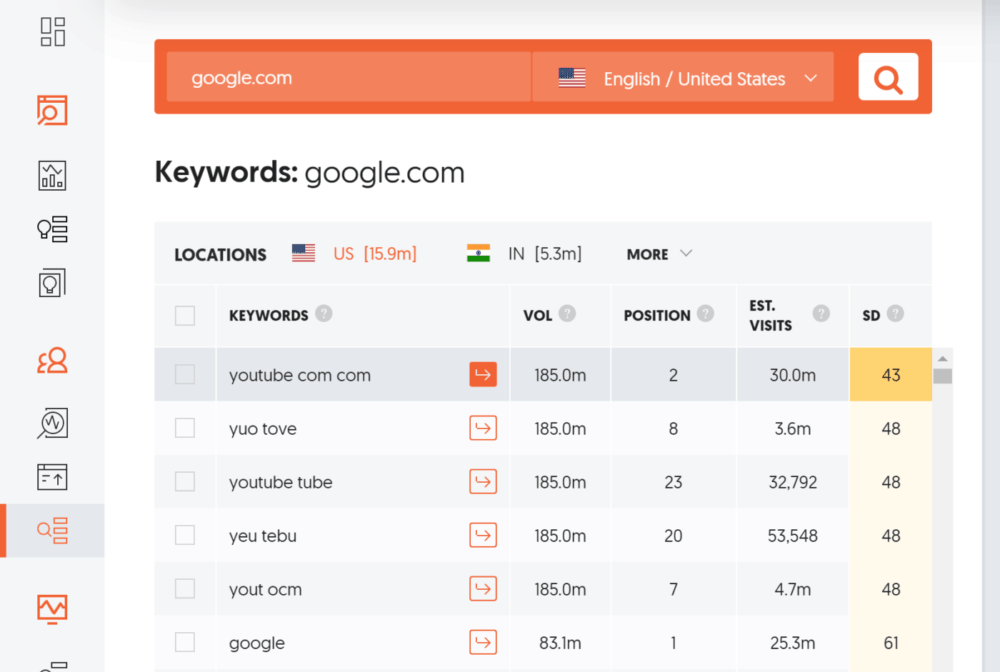
Knowing what keywords you currently rank for will make it easier to pick the best keywords to target moving forward. If you notice you do well with a particular keyword, you can figure out similar keywords to target and start picking that sweet, sweet low-hanging fruit.
Additionally, it will prevent you from trying to rank for the same keywords over and over again.

Step 3: Determining Your Related Keywords
Remember how we just covered picking keywords that were similar to the keywords you’re already ranking for? Well, we’re back at it. Only this time, we’re not just focusing on the keyword phrases you’re already doing well with.
This time, we will drill down all of the keywords we uncovered in Step 2 another time.
Here’s how you do it:
Go ahead and start at the top of your keyword list from Step 2. Then, head over to Google and start typing it in. For our example, we’ll use “web design best practices.” As you start typing, you’ll see a drop-down below the search bar where Google attempts to autofill what you’re typing. As you’ll notice, they are highly related to what you are typing.
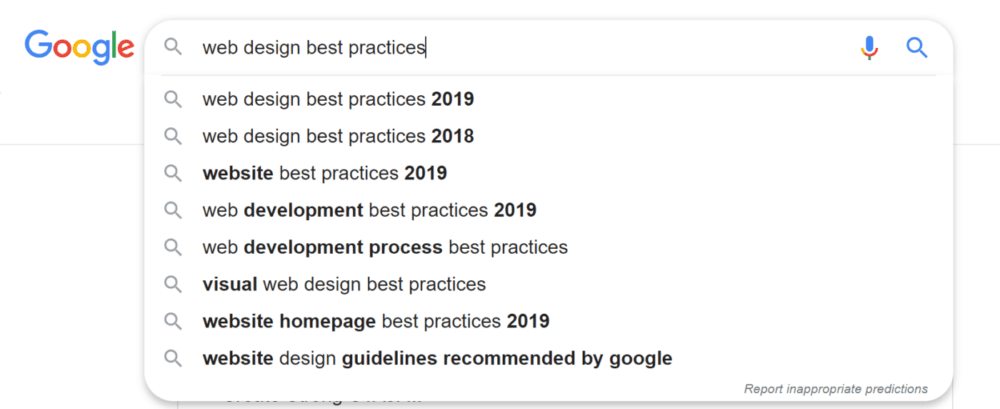
You can also find more Google suggestions if you scroll to the bottom of the page. They’ll look like something like this:
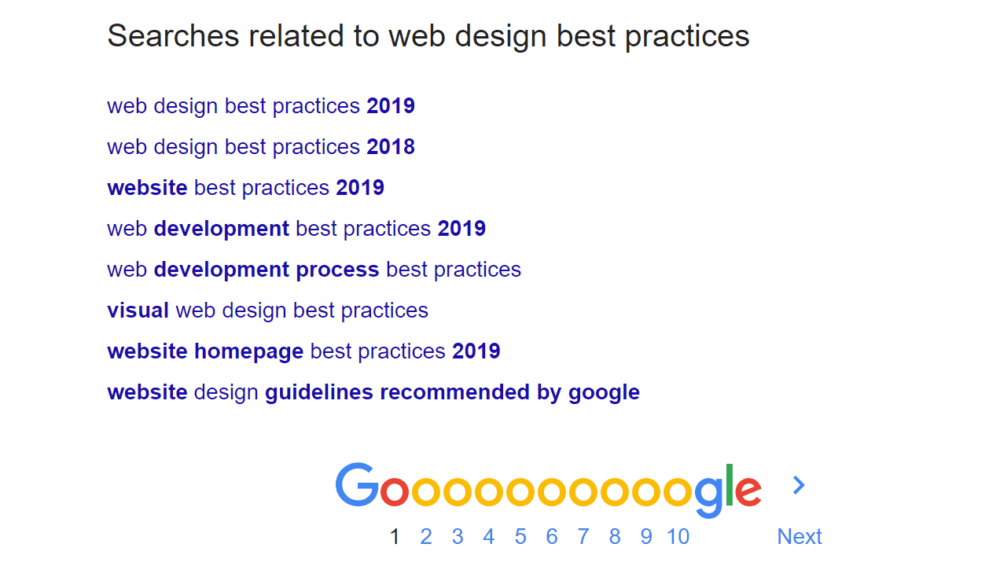
Please take note of these suggestions as well as any additional keywords that they inspired.
RELATED POST: SEO for Humans
Step 4: Add Long Tail Keywords Into The Mix
Essentially, there are two types of keywords we’ll be using: head keywords and long-tail keywords. Both are important to include in your picks for the best keywords.
Head Keywords
Head keywords are sometimes referred to as head terms, and if you’ve been working through the steps with us, you quite likely already have some on your list. Head keywords are broad and more far-reaching than long-tail keywords. Head keywords are much like the topic ideas you came up with in Step 1.
Let’s say you have an online shoe store. A head keyword for a shoe store would be things like “shoes” or even “running shoes.” While these keywords literally get billions and billions of searches every month, it is tough to rank for them. The competition is very high.
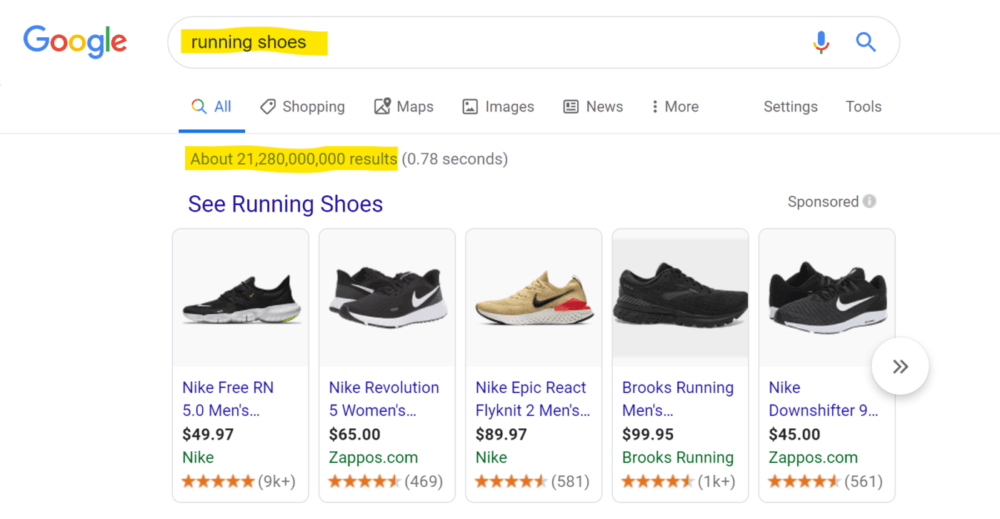
That’s one of the reasons it’s so important to include long-tail keywords into the mix.
Long-tail Keywords
Much like the name implies, long-tail keywords are longer in length than a head keyword. They usually have three or more words in them and are also much more specific.
For example:
“shoes” = head keyword
“men’s brown leather dress shoes near me” = long-tail keyword
See the difference there?
Now that we’ve cleared up the difference between head and long-tail keywords let’s talk about why you need both. So, we already know head keywords get more searches but are more difficult to rank for. Long-tail keywords get fewer monthly searches but are (usually, not always) easier to rank for.
But here’s the real kicker…
The traffic you’ll get from long-tail keywords is much more likely to convert.
Think about it:
Someone performing a search for a more general search phrase like “shoes” is less likely to be at a “ready to purchase” phase in the buyer’s journey than someone who searched a more specific term like “men’s brown leather dress shoes near me.”
So, go through the list of keywords you have at this point and start thinking about how you can make them even more specific.
Ideally, you’ll have a solid list of head keywords as well as long-tail keywords. That is a major component when learning how to pick the best keywords.
RELATED POST: 7 Things You Can Do Now To Boost On-Page SEO
Step 5: Scope Out The Competition

This is another area where maintaining a balance plays a key role in picking the best keywords. That is, you want a good balance of words your competitors are ranking for in addition to keywords they don’t rank for.
And, this is important:
Not all the keywords your competitors rank for will be useful for your business. You have to pick the best keywords from their list wisely.
Use a tool such as SEMRush to see what keywords the competition is ranking for. As you’re browsing through the results, take note of any highly relevant to your company. It’s okay if they include long-tail keywords or head terms.
The main priority is to select some that you know you can rank for quickly and some that will take you a little work, which you can realistically rank for.
Step 6: Get Google AdWords Involved (If you haven’t already)
Don’t be fooled by the name; Google AdWords Keyword Planner is useful for things other than making ads. Especially when it comes to picking the best keywords for your SEO strategy. AdWords will provide you with certain measurable data. Data that will make it easier for you to determine the best keywords from your list.
In this case, we’ll be using AdWords in combination with Google Trends. But that isn’t to say these are the only tools that can do the job. There are additional platforms that can do the same thing, so if you already have an app or service you like, by all means, feel free to use it.
In Google’s Keyword Planner, enter in a keyword and look at the results. You’ll primarily be looking for the search volume metric in addition to Google’s traffic estimate for that keyword.
Mark any keywords that don’t look competitive or are too competitive for your company to rank for.

Now, head over to Google Trends. Once there, we’ll check all the keywords, including those marked for competitiveness (or lack thereof). In some cases, the keywords you marked as not worth it just a moment ago in Keyword Planner may actually be good keywords.
Check to make sure they aren’t expecting an upward trend in the future. If so, it may be a great opportunity to get in while the getting is easy. You can start investing in content based on those keywords now while there is low competition. Just remember to monitor them as time passes to stay on top of any new trends.
RELATED POST: 3 Media Web Garners TWO 2019 W3 Silver Awards
Congrats! You Just Learned How To Pick The Best Keywords For SEO
Now that you’ve got a good idea of how to choose keywords for your website, you are ready to start rocking out some content. Use your list to plan out your content strategy and work your way up the Google rankings.
You’ve got this!
Just one last bit of advice before sending you out there, remember that it’s good practice to readdress your list every quarter. Things can change quickly in the world of Google, and reevaluating your keywords is a good way to ensure you make it to the top and stay there.
Lastly, if you need help optimizing your website and its content, reach out to 3 Media Web to learn how we help companies from all industries create and maintain websites with powerful SEO. We’re here to help.


